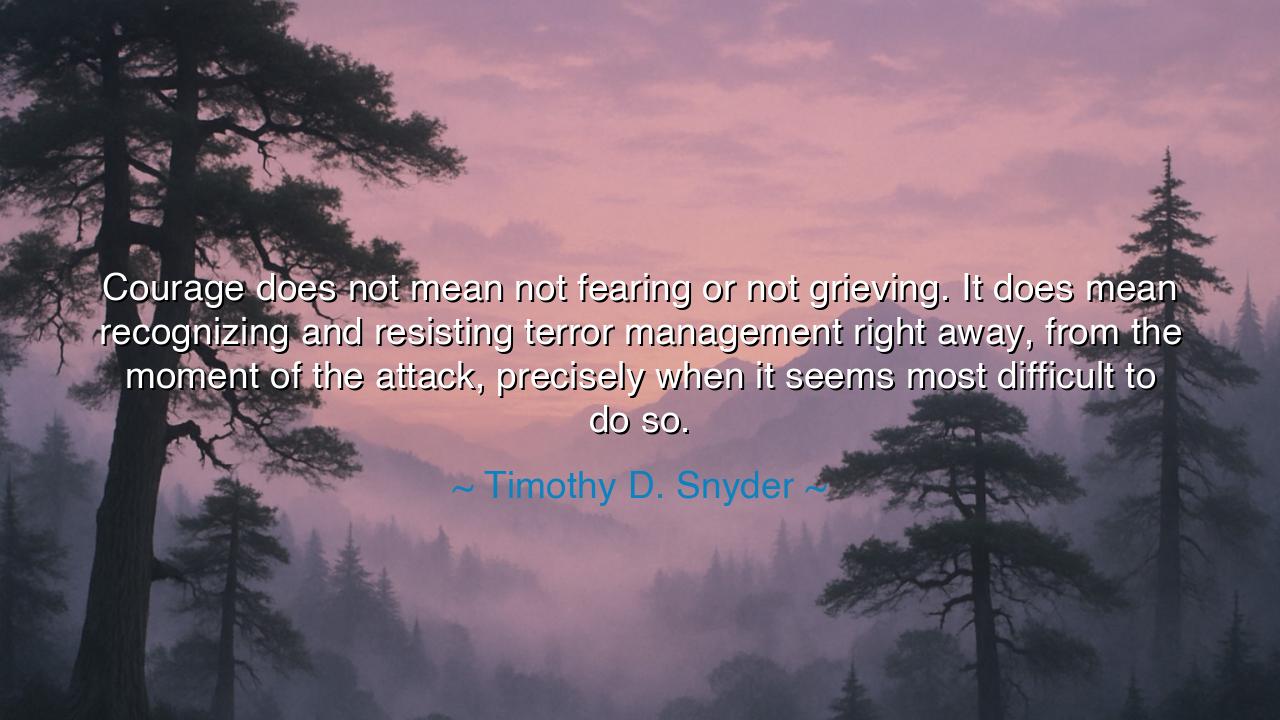
Courage does not mean not fearing or not grieving. It does mean
Courage does not mean not fearing or not grieving. It does mean recognizing and resisting terror management right away, from the moment of the attack, precisely when it seems most difficult to do so.






When Timothy D. Snyder, the historian of tyranny and the chronicler of freedom’s fragility, wrote, “Courage does not mean not fearing or not grieving. It does mean recognizing and resisting terror management right away, from the moment of the attack, precisely when it seems most difficult to do so,” he was teaching not merely the definition of bravery, but the discipline of the soul. His words emerge from a study of the darkest chapters of history — the rise of dictators, the fall of democracies, the terror that men use to break the will of nations. And yet, his insight is not political alone; it is profoundly human. For he speaks to the ancient truth that courage is not the absence of fear, but the triumph of the spirit over it. To be courageous is not to feel nothing, but to act rightly in the very hour when the heart trembles.
Snyder’s phrase, “terror management,” comes from the language of psychology, yet he wields it as a moral weapon. He reminds us that when fear strikes — whether from violence, lies, or catastrophe — the human mind seeks comfort in illusion. It reaches for safety, not truth. This is what tyrants exploit. In moments of collective terror, people surrender their reason to the promise of protection, giving power to those who demand obedience. Snyder saw this pattern not only in the twentieth century’s dictatorships, but in the modern world — where fear, if not resisted, can erode liberty as surely as any army. Thus, to “resist terror management” is to recognize the manipulation of fear and to refuse to become its instrument. Courage begins not on the battlefield, but in the mind that refuses to submit.
The ancients knew this long before our age of propaganda and media. The Stoics taught that man’s first battle is always within. When fear comes, they said, do not flee from it — observe it, name it, master it. For only the self-possessed can remain free. Socrates, when condemned to death by the city he loved, did not beg or rage; he accepted his fate with serenity, choosing truth over life itself. His courage was not born of blindness to fear — it was born of understanding it. He saw that death could harm the body, but not the soul that remains loyal to wisdom. In this, Socrates embodied the very teaching Snyder now revives: true courage means clarity at the moment of chaos, when all instincts scream to obey terror’s command.
History gives us many mirrors of this truth. When Winston Churchill faced the onslaught of Nazi power, his nation was paralyzed by dread. London burned, the seas were filled with warships, and many whispered of surrender. Yet Churchill rose, not as one untouched by grief or fear, but as one who mastered them. “If you’re going through hell,” he said, “keep going.” His greatness lay not in denial, but in recognition — he saw fear clearly, and in that seeing, stripped it of its control. The same courage was found in the hearts of ordinary citizens: mothers sending their children to safety, soldiers holding the line, writers refusing to spread lies. In their defiance, they resisted terror management — they refused to let fear dictate their morality.
Snyder’s teaching also speaks to the present world, where fear has become a weapon wielded daily — through images, rhetoric, and the machinery of information. Those who seek power understand that a frightened population can be made to obey. They will trade truth for security, freedom for safety, conscience for comfort. And so, Snyder warns us: courage must begin “from the moment of the attack.” It cannot wait until the terror passes, for by then the chains are already forged. The time to resist is not after fear has settled into the heart, but in the instant it begins to form — when the lie first whispers that surrender will bring peace.
This, then, is the essence of Snyder’s wisdom: Courage is the art of awakening the mind before fear can close it. It is not the stillness of stone, but the movement of fire — the will to act while trembling, the decision to think while afraid. To be courageous is to grieve without giving up, to suffer without surrendering one’s humanity. It is to say, even amid confusion: “I will not be ruled by fear, nor will I let fear make me unjust.” This is the courage of those who hid the persecuted, who spoke truth under censorship, who refused to harm the innocent for the sake of safety. It is the courage of conscience, the noblest form of resistance.
So, my listener, learn from this teaching as from the ancients. When terror comes — whether from the world, or from within your own heart — do not flee into false comfort. Face it, name it, and resist its dominion. Let courage be not the absence of pain, but the presence of purpose. Remember that fear’s first victory is not over the body, but over the mind. Therefore, guard your reason, your compassion, and your integrity. For as Snyder reminds us, it is in the hour when courage seems most impossible that it is most needed. And those who master fear at its birth — who resist even when trembling — become the guardians not only of themselves, but of all that is human and free.






AAdministratorAdministrator
Welcome, honored guests. Please leave a comment, we will respond soon